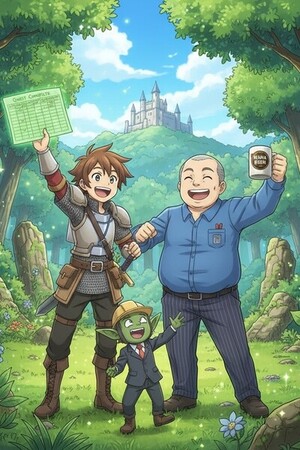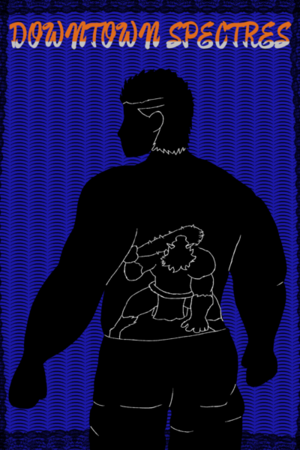Chapter 16:
Reveal
Earthly Solutions
The moment of realization hit both Mr. Tanaka and me simultaneously, with the kind of crushing embarrassment that makes you wonder if it's possible to actually die from it.
Marcus was apparently the assistant, not the master blacksmith. He toward the source of the voice with obvious relief, while Mr. Tanaka and I stood frozen in the particular kind of paralysis that comes from discovering you've been conducting an elaborate business presentation to completely the wrong person.
As we’ve all been there, I’m sure.
"They think I'm you," Marcus repeated to whoever had been speaking, and there was tiny choke in his voice that suggested he was about to cry from relief now that the ordeal was apparently ending.
From behind a workstation emerged a young woman who was perhaps five feet four inches tall, with the kind of compact, athletic build that suggested serious physical competence despite her relatively small stature. Her honey-gold hair was pulled back in a practical ponytail, and her leather apron over simple work attire, clearly designed for functionality rather than appearance, looked so appealing.
What struck me immediately was the way she moved: with the confident precision of someone who was certain of her capabilities and completely comfortable in her workspace. This was obviously a person who belonged here in a way that Marcus, for all his impressive physical presence, clearly did not.
"Miss Selena Brightforge ," she said simply, looking back and forth between Mr. Tanaka and me with an expression evaluating us like raw materials she was about to pulverize on an anvil. "I am the master blacksmith, sole heir of the Brightforge dynasty, owner of this establishment, and apparently the person you've been trying to conduct business with for the past twenty minutes."
The silence that followed this introduction was profoundly uncomfortable.
"I... we..." Mr. Tanaka started, his usual professional composure completely shattered.
"You assumed that the largest person in the smithy must be the master blacksmith," Selena continued with the matter-of-fact tone of someone who had clearly encountered this situation before. "Despite the fact that advanced metallurgy requires precision, technique, and years of specialized training rather than just physical strength."
"We sincerely apologize," I managed, feeling my face burn with embarrassment. "We made incorrect assumptions based on-"
"Based on the fact that most people assume blacksmithing is primarily about brute force rather than skill," she finished. "And that anyone renowned for master-level craftsmanship must obviously be a man."
Marcus was now grinning openly, apparently enjoying watching the situation resolve itself after his ordeal of trying to respond to our misdirected business presentation.
What a stupid grin. If I wasn’t so embarrassed and was physically capable of the consequences I’d slap it right off his face.
"In our defense," Mr. Tanaka said weakly, "we had only heard about your reputation and professional accomplishments. We weren't making assumptions about gender as much as... physical requirements for..."
He trailed off, apparently realizing that any attempt to explain our mistake was only going to make it worse.
Selena studied us for a moment longer, then her expression shifted slightly, not exactly friendly, but no longer actively hostile.
"Marcus," she said to her assistant, "thank you for trying to handle that diplomatically. You can get back to organizing the raw materials inventory."
"Yes, ma'am," Marcus said with obvious relief, heading toward the back of the smithy with enthusiasm now that he could retreat from the awkward encounter.
"Now then," Selena said, turning her full attention to us, "Earthly Solutions LLC, was it? Financial consulting and supply chain optimization?"
"Yes," I said, grateful for the opportunity to refocus on business rather than our embarrassing mistake. "We're hoping to establish strategic partnerships with local craftspeople to provide our clients with standardized, high-quality equipment at predictable prices."
"And you chose my smithy because...?"
"Because everyone in the adventuring community speaks of your work as the gold standard for professional equipment," Mr. Tanaka said, having recovered enough of his composure to deliver a coherent explanation. "Exceptional quality, reliable performance characteristics, and consistent delivery timelines."
"Our preliminary analysis suggests that your equipment offers superior total cost of ownership despite higher initial investment costs." I added.
Selena's eyebrows went up slightly. "Total cost of ownership?"
"Initial purchase price plus maintenance costs plus replacement frequency, calculated over the expected useful life of the equipment," Mr. Tanaka explained. "Your swords cost more upfront but last longer and maintain their performance characteristics better, which makes them more economical for professional adventurers."
"You've done financial analysis on my equipment?"
"Preliminary analysis based on client interviews and performance data," I confirmed. "We're hoping to develop more comprehensive cost-benefit studies through direct collaboration."
For the first time since she appeared, Selena looked genuinely interested rather than just politely tolerant.
"What kind of collaboration?"
Mr. Tanaka opened his briefcase and pulled out our prepared presentation materials. "Standardized product specifications, volume pricing agreements, predictable delivery schedules, and integrated inventory management systems."
"We provide you with guaranteed minimum orders and detailed market analysis," I continued. "You provide our clients with consistent, high-quality equipment that supports effective financial planning."
Selena took the documents and began reviewing them with the same systematic attention I'd observed in her workspace organization. She wasn't just scanning the pages—she was actually reading and evaluating our proposal with obvious professional competence.
"Interesting," she said after several minutes. "You're proposing to treat equipment procurement as a strategic business function rather than just an operational necessity."
"Precisely," Mr. Tanaka said, his enthusiasm beginning to return. "Most adventurers approach equipment purchases reactively. They buy replacements when their current gear breaks or becomes obsolete. We're suggesting a proactive approach based on predicted performance lifecycles and planned replacement schedules."
"Which benefits everyone," I added. "Adventurers get better equipment at more predictable costs, you get guaranteed business volume and advance planning for production scheduling, and we get the standardized specifications we need for accurate financial optimization."
Selena was making notes in the margins of our proposal. "These volume projections—are they realistic?"
"Conservative, actually," Mr. Tanaka said. "Based on our current client growth rates and market penetration analysis, we expect demand to exceed these estimates significantly."
"And you're confident you can deliver the guaranteed minimum orders?"
"We're confident enough to include financial penalties if we fall short of our commitments," I said. "This isn't just a proposal—it's a genuine business partnership with real accountability on both sides."
Selena looked up from the documents and studied us again, but this time her evaluation seemed focused on our professional competence rather than our earlier embarrassing mistake.
"You know," she said slowly, "most people who approach me about business arrangements are either trying to get discounts through personal connections or attempting to convince me to lower my quality standards to reduce costs."
"We're trying to do the opposite," Mr. Tanaka said. "We want to pay appropriate prices for premium quality because that provides better value for our clients in the long term."
"And we're hoping to help you optimize your production processes and inventory management to make premium quality more profitable for you to produce," I added.
Selena closed our proposal and looked around her smithy with the expression of someone who was calculating possibilities.
"I'll need time to review these specifications and run some preliminary cost analyses," she said finally. "But I have to admit, this is the first business proposal I've received that actually seems designed to benefit everyone involved rather than just whoever's making the proposal."
"That's because we've learned that sustainable business relationships require genuine mutual benefit," Mr. Tanaka said. "Our success depends on your success, and vice versa."
"When would you need an answer?"
"Take whatever time you need for proper evaluation," I said. "We'd rather have a well-considered decision than a rushed commitment."
Selena nodded approvingly. "I appreciate that. Most people want immediate answers to complex questions."
As we prepared to leave, I realized that despite our mortifying initial mistake, the meeting had actually gone quite well. Selena had evaluated our proposal seriously, asked intelligent questions, and seemed genuinely interested in exploring collaboration.
"Miss Brightforge," I said as we reached the smithy entrance, "thank you for your patience with our... misunderstanding... and for taking the time to consider our proposal seriously."
"And thank you for treating this as a professional business discussion rather than just an attempt to get favorable pricing through personal charm," she replied.
As we walked back toward our office, Mr. Tanaka was quiet for several minutes before finally speaking.
"Yamamoto," he said, "I think we just met someone who approaches her profession with the same level of systematic precision that we apply to financial optimization."
"And?"
"And I think this partnership could be even more successful than we initially projected."
Despite our embarrassing start, Selena Brightforge had demonstrated exactly the kind of professional competence and systematic thinking that would make her an ideal business partner.
There’s something intriguing about a girl who could maintain such a level of dignity and authority while being barely over five feet tall and working in a profession dominated by people twice her size.




Please sign in to leave a comment.